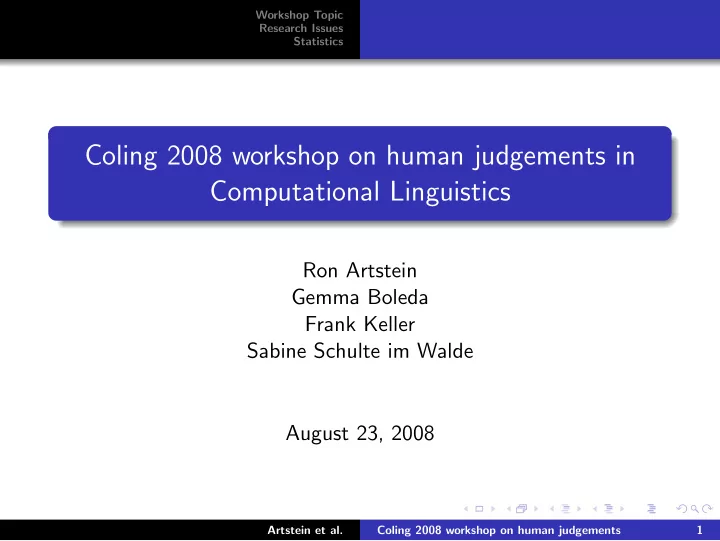

Workshop Topic Research Issues Statistics Coling 2008 workshop on human judgements in Computational Linguistics Ron Artstein Gemma Boleda Frank Keller Sabine Schulte im Walde August 23, 2008 Artstein et al. Coling 2008 workshop on human judgements 1
Workshop Topic Research Issues Statistics 1 Workshop Topic 2 Research Issues Theoretical Issues Reliability Learning from Disagreements Efficient Data Collection 3 Statistics Artstein et al. Coling 2008 workshop on human judgements 2
Workshop Topic Research Issues Statistics Topic Human judgments play a key role in computational linguistics: category inventories and annotation schemes are defined on the basis of judgments; lexicon creation or corpus annotation is conducted by experts via a sequences of linguistic judgments; system evaluation often involves judging the quality of system output or system performance. Artstein et al. Coling 2008 workshop on human judgements 3
Workshop Topic Research Issues Statistics Topic Questions concerning the design of judgment experiments: types of judgment experiments, design guidelines; lab-based vs. web-based experiments; methodologies for controversial tasks; role of ambiguity and polysemy in these tasks; appropriate level of granularity for judgment categories; type of participants (e.g., expert vs. naive); instructions and guidelines for participants. Artstein et al. Coling 2008 workshop on human judgements 4
Workshop Topic Research Issues Statistics Topic Questions concerning the analysis and interpretation of judgment data: importance of inter-annotator agreement; most suitable measures of agreement; other quantitative and qualitative methods for analyzing judgments; similarity/difference with practice in psycholinguistics; interaction of analysis procedures and annotation instructions. Artstein et al. Coling 2008 workshop on human judgements 5
Theoretical Issues Workshop Topic Reliability Research Issues Learning from Disagreements Statistics Efficient Data Collection Theoretical Issues Making a linguistics judgment is a categorization task: in the psychological literature, two main theories of categorization exist: the property view holds that the members of a category are defined by a unique set of features; the prototype view assumes that category membership is defined by in terms of similarity to a prototypical exemplar of that category; traditionally, generative linguistics have espoused a property view, and cognitive linguists a prototype view, of categories; it seems possible that some linguistic categories work through properties, while others through prototypes. Artstein et al. Coling 2008 workshop on human judgements 6
Theoretical Issues Workshop Topic Reliability Research Issues Learning from Disagreements Statistics Efficient Data Collection Theoretical Issues A recent theoretical issue is gradience in linguistic data: the literature on gradience has mainly focused on gradient grammaticality judgments; judgment techniques such as magnitude estimation have been developed to reliably elicit gradient judgments (Bard et al., 1996); however, there has been some work on gradient linguistic categories as well, e.g., Aarts’ (2008) distinction between intersective and subsective gradience; these development are yet to be reflected in computational linguistics. Artstein et al. Coling 2008 workshop on human judgements 7
Theoretical Issues Workshop Topic Reliability Research Issues Learning from Disagreements Statistics Efficient Data Collection Reliability Reliability of judgments is an ongoing research issue: Cohen’s κ has been a widely used to measure agreement for linguistic annotation since Carletta (1996); but this has recently been criticized (e.g., Di Eugenio and Glass, 2004; Poesio and Artstein 2008); alternative measures exist in the form of Krippendorff’s α , Scott’s π , Fleiss’ κ , etc. Bhowmick et al. (this workshop) propose an extension of κ to multi-category annotation. Artstein et al. Coling 2008 workshop on human judgements 8
Theoretical Issues Workshop Topic Reliability Research Issues Learning from Disagreements Statistics Efficient Data Collection Learning from Disagreements Another emerging issue is disagreements in judgments: disagreements can arise trivially due to errors, or due to genuine subjectivity in the judgment task; a key issue is the identification of the source of disagreements (Beigman Klebanov et al, this workshop); and how disagreements can be exploited for automatic classification (Reidsma et al., this workshop). Artstein et al. Coling 2008 workshop on human judgements 9
Theoretical Issues Workshop Topic Reliability Research Issues Learning from Disagreements Statistics Efficient Data Collection Efficient Data Collection In psychology, there has been a lot of interest in data collection over the internet (e.g., Birnbaum 2000): internet experimentation is very suitable for collecting linguistic judgments; offers access to a vast pool of participants and a wide range of languages and demographics; cost efficient, fast, experiments easy to set-up and analyze; but there are a number of open issues: data integrity and participant authentication; reliable presentation of instructions; recruitment of expert partitions; software (e.g., WebExp) and infrastructure for recruiting subjects (e.g., Mechanical Turk) readily available. Artstein et al. Coling 2008 workshop on human judgements 10
Workshop Topic Research Issues Statistics Statistics Workshop organization: 22 submissions received reviewed by program committee of 30 reviewers 8 papers accepted as talks 33 registered participants Sponsors: Spanish Education and Science Ministry via the KNOW project Sonderforschungsbereich 732, Universit¨ at Stuttgart Artstein et al. Coling 2008 workshop on human judgements 11
Recommend
More recommend